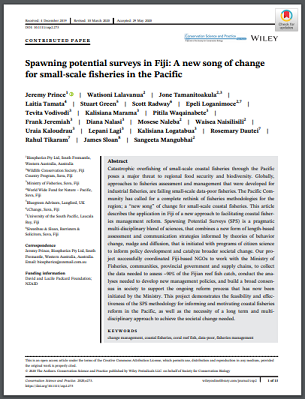
Catastrophic overfishing of small-scale coastal fisheries through the Pacific poses a major threat to regional food security and biodiversity. Globally, approaches to fisheries assessment and management that were developed for industrial fisheries, are failing small-scale data-poor fisheries. The Pacific Community has called for a complete rethink of fisheries methodologies for the region; a “new song” of change for small-scale coastal fisheries. This article describes the application in Fiji of a new approach to facilitating coastal fisheries management reform. Spawning Potential Surveys (SPS) is a pragmatic multi-disciplinary blend of sciences, that combines a new form of length-based assessment and communication strategies informed by theories of behavior change, nudge and diffusion, that is initiated with programs of citizen science to inform policy development and catalyze broader societal change. Our project successfully coordinated Fiji-based NGOs to work with the Ministry of Fisheries, communities, provincial government and supply chains, to collect the data needed to assess ~90% of the Fijian reef fish catch, conduct the analyses needed to develop new management policies, and build a broad consensus in society to support the ongoing reform process that has now been initiated by the Ministry. This project demonstrates the feasibility and effectiveness of the SPS methodology for informing and motivating coastal fisheries reform in the Pacific, as well as the necessity of a long term and multidisciplinary approach to achieve the societal change needed.












